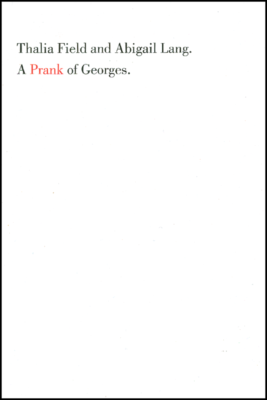
THALIA FIELD is the author of three books with New Directions (Point and Line, 2000; Incarnate: Story Material, 2004; and >em>Bird Lovers, Backyard, 2010). She also published numerous journals, most recently Conjuctions, Tin House, Seneca Review, and Angelaki (Journal of the Theoretical Humanities.) Thalia teaches in the Literary Arts department of Brown University.
ABIGAIL LANG is the author of Le monde compte rendu, Lectures de Louis Zukofsky (ENS editions), and the co-editor of Double Change, A Film Archive of Poetry, 1 and 2 (Motion Method Memory / Presses du reel, 2009). A translator of American poetry into French, she teaches at the University of Paris-Diderot.
“In A Prank of Georges, Abigail Lang & Thalia Field create a dazzling set of variations in, about, and around lines from Gertrude Stein. Stein’s lines become threads with which Lang & Field weave a text heterolingual and ludic, in which the play of names becomes a matter of meaning’s performing. The question here is not ‘what the poem says,’ but how it keeps on keeps on saying.”
— Charles Bernstein
“A convoy, a motley, a mob of ‘machines.’ Machines? By George! Gertrude Stein cranks the motor, and we’re off to the carnival, the roller-coaster ride across genres, languages, typefaces – and names. American names especially, where Wilson may come from Witkiewicz and Castle from Katzenellenbogen. It’s dazzling. It’s a riot. It self-deconstructs, but it won’t disappoint you.”
— Rosemarie Waldrop
“For William Carlos Williams a poem is a small or large machine made out of words. Thalia Field and Abigail Lang have taken this proposition seriously, yet playfully. Their luminous pas de deux ludically conjures Gertrude Stein to construct a textual game that leaps linguistic and cultural rifts to find the commonalities of ‘various chain.’ Together these poets return us to the primal force of language: naming.”
— Susan Howe

